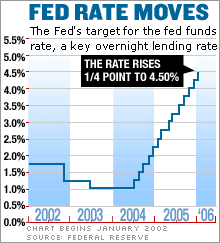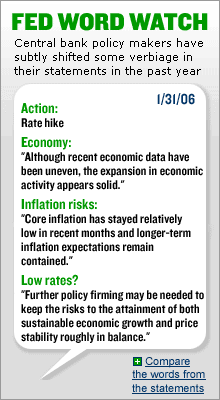Fed raises rates again
In Greenspan's last meeting, central bank boosts rates, cuts 'measured' language; what will new chair Bernanke do next?
NEW YORK (CNNMoney.com) - The Federal Reserve raised a key short-term interest rate another quarter-point Tuesday and said it may have to raise rates further in chairman Alan Greenspan's last meeting after more than 18 years at the helm of the central bank. Speculation now turns to what new Fed chairman Ben Bernanke, who officially takes over on Feb. 1, will do when the Fed's monetary policy committee meets next on March 28. Bernanke was confirmed to succeed Greenspan by the Senate Tuesday afternoon.
Some economists argue Bernanke will need to raise rates one more time to show that he is serious about fighting inflation. But others say the Fed has already nipped inflation in the bud and that further rate hikes could unnecessarily hurt the economy. To that end, the government reported last week that economic growth slowed to 1.1 percent in the fourth quarter, the weakest pace in three years. After the latest rate hike, the central bank's fourteenth since June 2004, the target for the federal funds rate now stands at 4.5 percent, the highest in nearly five years. The overnight bank lending rate is important since it influences the rates consumers and businesses pay on many types of loans. The Fed had hinted in the minutes of its past two meetings that its series of rate hikes may soon be nearing an end. But in the statement accompanying Tuesday's decision, the central bank said that "some further policy firming may be needed," an indication that the Fed has not finished raising rates just yet. However, it did finally get rid of the term "measured", a word it had used to describe the pace of further hikes since it began raising rates in 2004. The central bank also appeared to dismiss the sluggish fourth-quarter gross domestic product (GDP) report. "Although recent economic data have been uneven, the expansion in economic activity appears solid," the Fed said. On Wall Street, stocks fell modestly after the announcement while Treasury bond prices ended little changed. (Full story). For more on the bond market, click here. It's understandable why investors might be a bit confused. Bernanke faces an economy that grew at a slower-than-expected pace during the fourth quarter but is expected to rebound in the first quarter. He will also need to closely monitor the price of oil, which some think could rise even higher due to political tensions in the Middle East. So for the first time in recent memory, it's going to be a lot more difficult for the market to predict future Fed moves. "The last 14 Fed meetings have been anticlimactic. The Fed came, they saw, they tightened and told us to expect more of the same," said Colin Lundgren, fixed-income strategist at RiverSource Investments, a subsidiary of Ameriprise Financial. "Looking ahead, things are starting to get more interesting. The outlook for economy now is less certain." Investors will need to get used to how Bernanke will handle Fed meetings and will need to start poring over his speeches for clues about what he thinks about the economy. Their first opportunity should come on Feb. 15, when Bernanke makes his first semi-annual testimony to Congress about the state of the economy. Still, Matthew Smith, portfolio manager with Smith Affiliated Capital, a New York-based money management firm specializing in bonds, said he expects Bernanke will raise rates in March but that might be the only time he will have to do so, for the foreseeable future at least. Smith argued that inflation is not a major threat, especially since high energy prices have not filtered into the prices of other consumer goods. In addition, salaries have not risen dramatically and that is typically one of the biggest signs of inflation. "Let's be real. Core inflation expectations are low, wage growth is low and throw on top of that a housing market that's cooled and there are really no credible reasons for raising rates much further," Smith said. Some have argued that one key reason the Fed has raised rates as much as it has is in order to slow down the real estate market. Many feared a housing bubble, similar to the stock market bubble of the late 1990s, and felt that without an increase in rates, mortgage rates would have stayed low enough to fuel even more speculation in the housing market. Neil Garfinkel, a partner focusing on real estate and banking law with Abrams Garfinkel Margolis Bergson LLP, said that the housing market probably could withstand another interest rate hike in March to 4.75 percent. But he, like, Smith, hopes that Bernanke only raises rates once more. "I don't think there's any surprise with today's bump in rates and I don't think there will be a surprise with another bump in March," he said. "But I'm hoping that the Fed stops at that point. The housing market has factored in two rate increases this year but after that it could get dicey." With that in mind, Keith Hembre, chief economist with First American Funds in Minneapolis, said he believes Bernanke will be cautious and not simply raise rates just to prove that he will be tough on inflation. Bernanke could justify one rate hike in March, Hembre said, but beyond that, there would need to be more evidence of serious inflation, such as several months of more robust job growth and wage increases, to make a fed funds rate of 5 percent or higher necessary. "Further moves will be dictated by the tone of the data leading up to the next meetings," Hembre said. "This is not to say that the fed funds rate couldn't go to 5 percent but there would need to be more underlying strength in the economy to drive it there." Most market observers said they felt Bernanke would be able to handle the economy as adeptly as Greenspan did and that the transition at the Fed should be fairly smooth. But some were worried about Bernanke's ability to handle a crisis, should one arise. "I haven't felt like this since my Mom took away my teddy bear," said RiverSource's Lundgren. "Greenspan has been a source of comfort. Bernanke has healthy credentials but he hasn't been with us with for the past 18 years." To read the full Fed statement, click here.
For more about Greenspan's legacy, click here. |
| |||||||||


